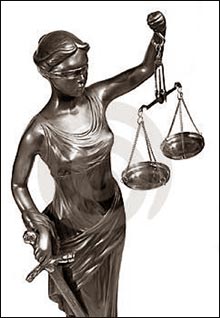Justice and the world
Amartya Sen
If the reliance on public reasoning is an important aspect of the
approach to justice, so is the form in which questions of justice are
asked. There is a strong case for replacing what I have been calling
transcendental institutionalism - that underlies most of the mainstream
approaches to justice in contemporary political philosophy, including
John Rawls’s theory of justice as fairness - by focussing questions of
justice, first, on assessments of social realizations, that is, on what
actually happens (rather than merely on the appraisal of institutions
and arrangements); and second, on comparative issues of enhancement of
justice (rather than trying to identify perfectly just arrangements).
|

Law is equal to all Picture: dreamstime.com |
The approach developed in this book is much influenced by the
tradition of social choice theory (initiated by Condorcet in the 18th
Century and firmly established by Kenneth Arrow in our own time), and
concentrates, as the discipline of social choice does, on making
evaluative comparisons over distinct social realisations. In this
respect, the approach here also has important similarities with the
works of Adam Smith, Jeremy Bentham, John Stuart Mill and Karl Marx,
among others.
While the roots of the approach go back to the Enlightenment, there
is a significant contrast with another tradition particularly cultivated
over that period - the discipline of reasoning about justice in terms of
the idea of a social contract.
The contractarian tradition goes back at least to Thomas Hobbes, but
also had major contributions from Locke, Rousseau and Kant, and in our
time from leading philosophical theorists from Rawls to Nozick,
Gauthier, Dworkin and others.
In opting for the social choice approach rather than that of the
social contract, it is not of course my intention to deny the
understanding and illumination that have been generated by the latter
approach to justice.
However, enlightening as the social contract tradition is, I have
argued that its limitations in providing an underpinning for a theory of
justice with adequate reach are so strong that it ultimately serves
partly as a barrier to practical reason on justice.
The theory of justice, which is most widely used now and which has
served as the point of departure for this work is, of course, the theory
of ‘justice as fairness’ presented by John Rawls.
Even though Rawls’s broad political analysis has many other elements,
his justice as fairness has the characteristics of being directly
concerned only with the identification of just institutions.
There is a transcendentalism here, even though Rawls made deeply
enlightening observations on comparative issues and also tried to take
note of possible disagreements on the nature of a perfectly just
society. Rawls focussed on institutions as the subject matter of his
principles of justice.
His concentration on institutional choice does not, however, reflect
his lack of interest in social realisations.
The social realisations are assumed in Rawls ‘justice as fairness’ to
be determined by a combination of just institutions and fully compliant
behaviour by all to make a predictable transition from institutions to
states of affairs. This is related to Rawls attempt at getting to a
perfectly just society with a combination of ideal institutions and
corresponding ideal behaviour.
In a world where those extremely demanding behavioural assumptions do
not hold, the institutional choices made will tend not to deliver the
kind of society that would have strong claims to being seen as perfectly
just.
In a memorable observation in the Leviathan, Thomas Hobbes noted that
the lives of people were ‘nasty, brutish and short’.
That was a good starting point for a theory of justice in 1651, and I
am afraid it is a still good starting point for a theory of justice
today, since the lives of so many people across the world have exactly
those dire features, despite the substantial material progress of
others. Indeed, a good deal of the theory presented here has been
directly concerned with people’s lives and capabilities, and the
deprivation and suppression suffered.
Even though Hobbes moved on from his powerful characterisation of
human deprivation to the idealist approach of a social contract, there
can be little doubt about the life-enhancing motivations that inspired
Hobbes.
Much the same thing can be said about the theories of justice of
Rawls or Dworkin or Nagel today, for example, even though formally they
have anchored their principles of justice to certain arrangements and
rules (thereby going in the direction of niti, rather than nyaya),
rather than directly to social realisations and human lives and
freedoms. The connections between the disparate theories of justice have
to be firmly noted since, in the debates about different theories, the
focus tends to be on differences rather than on similarities.
I realize that I too have largely succumbed to the analytical
temptation to concentrate on distinctions and to highlight contrasts.
And yet there is an important shared involvement in being concerned with
justice in the first place.
No matter where our theories of justice take us, we all have reasons
to be grateful for the recent intellectual animation around them, which
has been, to a great extent, initiated and inspired by John Rawls
pioneering move in this field, beginning with his outstanding paper in
1958 (‘Justice as Fairness’).
Philosophy can - and does - produce extraordinarily interesting and
important work on a variety of subjects that have nothing to do with the
deprivations and inequities and unfreedoms of human lives.
This is as it should be, and there is much to rejoice in the
expansion and consolidation of the horizon of our understanding in every
field of human curiosity. However, philosophy can also play a part in
bringing more discipline and greater reach to reflections on values and
priorities as well as on the denials, subjugations and humiliations from
which human beings suffer across the world. A shared commitment of
theories of justice is to take these issues seriously and to see what
they can do in terms of practical reasoning about justice and injustice
in the world.
|

Ensuring social justice, a global concern AFP |
If epistemic curiosity about the world is one tendency that many
people have, concern about goodness, rightness and justness also has a
powerful presence - manifest or latent - in our minds. Distinct theories
of justice may compete in finding the right use of that concern, but
they share the significant feature of being involved in the same
pursuit.
Many years ago, in a justly famous paper called ‘What Is It Like to
Be a Bat?’, Thomas Nagel presented some foundational ideas on the
mind-body problem.
The pursuit of a theory of justice has something to do with a similar
question: what is it like to be a human being? In his paper, Nagel too
was actually involved with human beings, and only very marginally with
bats.
He argued powerfully against the cogency of understanding
consciousness and mental phenomena by trying to see them in terms of the
corresponding physical phenomena (as is attempted by many scientists and
some philosophers), and in particular, he differentiated the nature of
consciousness from the connections - causal or associative - that may
link it to bodily operations. Those distinctions remain, and my reason
for asking what it is like to be a human being is different - it relates
to the feelings, concerns and mental abilities that we share as human
beings.
In arguing that the pursuit of a theory of justice has something to
do with the kind of creatures we human beings are, it is not at all my
contention that debates between theories of justice can be plausibly
settled by going back to features of human nature, rather to note the
fact that a number of different theories of justice share some common
presumptions about what it is like to be a human being.
We could have been creatures incapable of sympathy, unmoved by the
pain and humiliation of others, uncaring of freedom, and - no less
significant - unable to reason, argue, disagree and concur. The strong
presence of these features in human lives does not tell us a great deal
about which particular theory of justice should be chosen, but it does
indicate that the general pursuit of justice might be hard to eradicate
in human society, even though we can go about that pursuit in different
ways.
I have made considerable use of the existence of the human faculties
just mentioned (for example, the ability to sympathise and to reason) in
developing my argument, and so have others in presenting their theories
of justice.
There is no automatic settlement of differences between distinct
theories here, but it is comforting to think that not only do proponents
of different theories of justice share a common pursuit, they also make
use of common human features that figure in the reasoning underlying the
irrespective approaches.
Because of these basic human abilities - to understand, to
sympathize, to argue - people need not be inescapably doomed to isolated
lives without communication and collaboration.
It is bad enough that the world in which we live has so much
deprivation of one kind or another (from being hungry to being
tyrannized); it would be even more terrible if we were not able to
communicate, respond and altercate.
When Hobbes referred to the dire state of human beings in having
‘nasty, brutish and short’ lives, he also pointed, in the same sentence,
to the disturbing adversity of being ‘solitary’.
Escape from isolation may not only be important for the quality of
human life, it can also contribute powerfully to understanding and
responding to the other deprivations from which human beings suffer.
There is surely a basic strength here which is complementary to the
engagement in which theories of justice are involved. (Courtesy: The
Hindu) |



